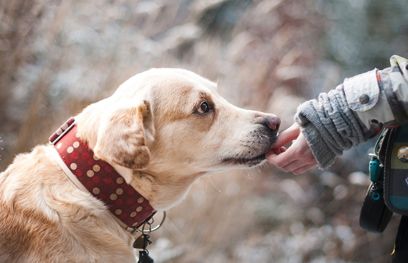Pesach: Guidelines for Feeding Animals

What do we do about pet food on Pesach? Does it need a hechsher? What about farmers? Comprehensive halachic guidelines on feeding animals during Pesach.
The halachic principles are as follows:
1. It is forbidden to derive benefit from chametz on Pesach,[1] so it is forbidden to feed chametz to animals in our possession.[2]
2. It is also forbidden to benefit from chametz that belongs to a non-Jew. This is why even if the chametz was sold to a non-Jew, we may not use it for our animals (pets/livestock).[3]
3. The prohibition of chametz on Pesach includes bal yera'eh; that is, we may not have chametz in our domain that can be seen on Pesach. For this reason, we cannot store chametz on our property for animals that do not belong to us.
4. Ta'arovet chametz (a chametz mixture). This term has two meanings: one is a professional term that indicates concentrated feed that includes various kernels, seeds, vitamins, etc.; it is also a halachic term, which means that chametz is mixed in along with other foods and is not identifiable on its own.
-
- Ramifications of the professional term: most machines that prepare animal feed first wet the kernels before processing them. Even if it is dried afterwards, since the kernels were initially wet the entire mixture is considered chametz.
- Ramifications of the halachic term: the criteria that determines whether a food in a chametz mixture is indeed chametz is that it is worthy for a dog's consumption (ra'uy la'achilat kelev). For this reason, animal food is included under the umbrella of the prohibition of ta'arovet chametz. Such a chametz mixture that was prepared during Pesach is forbidden even when the amount of chametz it contains is minimal.
Only if the chametz content can be nullified in a 1:60 ratio and was prepared before Pesach, there can be two possible scenarios:
(1) If the mixture is wet, then it is permitted according to all opinions,
(2) If the mixture is dry, or the chametz imparts a flavor, there are those who hold that it is forbidden on Pesach, while others permit it.[4]
The main ramification of the above is in the following case: (1) when animals can only eat a certain type of food, and without it the animal will suffer significantly; (2) when the chametzdik component of the food that is appropriate for the animal is less than a sixtieth of the mixture; (3) the mixture is prepared before Pesach; and (4) is not fit for human consumption,[5] it is permissible to be lenient and feed it to animals on Pesach. Of course, this is only when there is no appropriate alternative that is kosher for Pesach.
5. One may not place in front of an animal dry kernels from the five grains, since there is a reasonable concern that they will get wet from the animal's saliva or the water dish in the animal's cage, and in this way it will become chametz.[6]
6. A rule of thumb: if gluten appears in the list of ingredients, then this indicates that the food includes at least one of the five grains, and it is forbidden to use it as animal feed on Pesach. However, even if gluten does not appear, it is possible that there are other wheat-ingredients, such as starch, which is also forbidden on Pesach.
7. Even if this will cause suffering to the animal, one may not feed chametz to an animal on Pesach, unless the food meets the criteria listed above (4b).
8. Advanced preparation and consultation with a veterinarian before Pesach often prevents many questions on Pesach itself.
9. One should clean out the food trays several days before Pesach.
|
Animal |
Appropriate Food on Pesach |
Forbidden Food on Pesach |
Notes |
|
Pet birds: parrots, parakeets, etc. |
Fresh vegetables, legume kernels: millet, etc. |
Kernels from the five grains. |
It is even prohibited to feed them a small quantity of kernels from the five grains. |
|
Large mammals (herbivores): sheep / cattle |
Feed/hay/silage composed of legumes |
Feed/hay/silage composed of the five grains. |
Kosher-for-Pesach animal feed is highly available; advanced preparations are necessary. |
|
Large mammals (carnivores): dogs, cats, ferrets |
Kosher-for-Pesach food is available. If one does not find any, it is possible to feed these animals meat, legumes, and crumbled matzah. It's also permitted to feed them gluten-free meat products. |
Food with gluten. |
|
|
Small mammals: hamsters, rabbits |
Fresh vegetables, legume kernels: millet, etc. Fresh vegetables is generally sufficient. |
Kernels from the five grains. |
Hamsters tend to store food in their cheeks. One may not feed them even a small amount of kernels from the five grains, since during the hoarding process the kernels will become wet from their saliva and ferment. |
|
Fish |
Worms/seaweed. In extenuating circumstances, if the food is not fit for human consumption, and one cannot visually identify chametz but it is mixed into the food, and the mixture was prepared before Pesach - one may feed the fish before Pesach with food that will last the entire duration of Pesach. |
|
Even if there is no hechsher, if the food is based only on seaweed, it is possible to feed it to fish. Fish food is generally not fit for human consumption. |
[1] Shulchan Aruch OC §443:1
[2] Ibid.
[3] Rema, Shulchan Aruch, ibid.
[4] Shulchan Aruch OC §447:4
[5] Shulchan Aruch OC §442:4
[6] Mishna Berura §466:2
